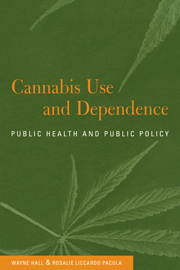Book contents
- Frontmatter
- Dedication
- Contents
- List of figures and tables
- Foreword
- Acknowledgements
- 1 Introduction
- Section 1 Cannabis the drug and how it is used
- Section 2 The health effects of cannabis
- Section 3 The psychological effects of chronic cannabis use
- 7 Cannabis dependence
- 8 The effects of cannabis use on cognitive functioning
- 9 Cannabis use and psychotic disorders
- Section 4 Effects on adolescent development
- Section 5 Harms and benefits of cannabis use
- Section 6 The effectiveness and costs of cannabis prohibition
- Section 7 Policy alternatives
- Appendix 1
- Appendix 2
- References
- Index
7 - Cannabis dependence
from Section 3 - The psychological effects of chronic cannabis use
Published online by Cambridge University Press: 05 July 2016
- Frontmatter
- Dedication
- Contents
- List of figures and tables
- Foreword
- Acknowledgements
- 1 Introduction
- Section 1 Cannabis the drug and how it is used
- Section 2 The health effects of cannabis
- Section 3 The psychological effects of chronic cannabis use
- 7 Cannabis dependence
- 8 The effects of cannabis use on cognitive functioning
- 9 Cannabis use and psychotic disorders
- Section 4 Effects on adolescent development
- Section 5 Harms and benefits of cannabis use
- Section 6 The effectiveness and costs of cannabis prohibition
- Section 7 Policy alternatives
- Appendix 1
- Appendix 2
- References
- Index
Summary
Motivational effects
Chronic daily cannabis users in Egypt and the Caribbean have been reported to showed impaired motivation (Brill and Nahas, 1984). Some young cannabis users in the USA in the early 1970s who were described as apathetic, withdrawn, lethargic and unmotivated (McGlothlin and West, 1968) were said to suffer from an ‘motivational syndrome’ (McGlothlin and West, 1968). The difficulty with these case reports was in disentangling the effects of chronic cannabis use from poverty, poor education and pre-existing psychiatric disorders (Edwards and Gross, 1976).
The effects of cannabis use on motivation were assessed in a number of field studies of chronic cannabis users in Costa Rica (Carter, 1980), Jamaica (Rubin and Comitas, 1975) and the USA (Halikas et al., 1982). Rubin and Comitas (1975), for example, found that Jamaican farmers who regularly smoked cannabis laboured more intensely but less efficiently after using cannabis. A study in Costa Rica, comparing cannabis smokers and non-users, produced mixed results (Carter, 1980). Non-users were more likely to be in full-time employment and to be stably employed but users who had steady jobs or were self-employed smoked more cannabis than those who were not.
A follow-up study of long-term cannabis users in the USA suggests that the amotivational syndrome is rare among long-term users. Halikas et al. (1982) assessed symptoms of the amotivational syndrome in 100 regular cannabis users six to eight years after they were first interviewed. Only three individuals reported amotivational symptoms in the absence of depression and they did not differ from the other cannabis users in their patterns of use.
Laboratory studies of long-term heavy cannabis use have also failed to clearly show that cannabis impairs motivation (Edwards and Gross, 1976). Early studies conducted by the LaGuardia Commission (see Mendelson et al., 1974) reported deterioration in behaviour among prisoners given daily doses of cannabis over a period of weeks but these reports were uncontrolled. A controlled study using standardised measures of performance failed to observe any effects of cannabis use (Mendelson et al., 1974).
- Type
- Chapter
- Information
- Cannabis Use and DependencePublic Health and Public Policy, pp. 70 - 78Publisher: Cambridge University PressPrint publication year: 2002



